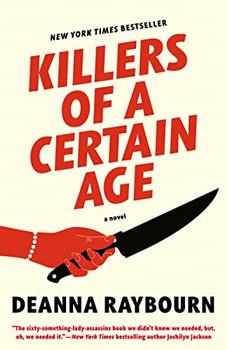Summary | Excerpt | Reading Guide | Reviews | Beyond the book | Read-Alikes | Genres & Themes | Author Bio

They've spent their lives as the deadliest assassins in a clandestine international organization, but now that they're sixty years old, four women friends can't just retire – it's kill or be killed in this action-packed thriller by New York Times bestselling and Edgar Award-nominated author Deanna Raybourn.
Older women often feel invisible, but sometimes that's their secret weapon.
Billie, Mary Alice, Helen, and Natalie have worked for the Museum, an elite network of assassins, for forty years. Now their talents are considered old-school and no one appreciates what they have to offer in an age that relies more on technology than people skills.
When the foursome is sent on an all-expenses-paid vacation to mark their retirement, they are targeted by one of their own. Only the Board, the top-level members of the Museum, can order the termination of field agents, and the women realize they've been marked for death.
Now to get out alive they have to turn against their own organization, relying on experience and each other to get the job done, knowing that working together is the secret to their survival. They're about to teach the Board what it really means to be a woman—and a killer—of a certain age.
The constant girl-power references and callouts feel a bit stale and inorganic, but the premise is a good vehicle for an action-mystery-assassin story, and the book delivers on everything we might want: Tricks of the trade (if you're disoriented underwater, breathe out and then follow the bubbles to the surface; soak tobacco in water to make poison), a detailed scene of losing a tail in New Orleans' French Quarter, another of escaping bodyguards in the Paris catacombs, an elaborate scheme in Zanzibar to kill one of the few living Nazis. The tension is low, but the mystery remains alive until the last pages...continued
Full Review
 (634 words)
(634 words)
(Reviewed by Chloe Pfeiffer).
 In Deanna Raybourn's novel Killers of a Certain Age, four women are betrayed by a fictional organization of assassins they joined that was formed to hunt down and kill former Nazis after the end of World War II and the fall of the Third Reich. Part of the organization's goal is recovering any artworks the Nazis may have looted and hoarded, and returning the art to its previous, rightful owner.
In Deanna Raybourn's novel Killers of a Certain Age, four women are betrayed by a fictional organization of assassins they joined that was formed to hunt down and kill former Nazis after the end of World War II and the fall of the Third Reich. Part of the organization's goal is recovering any artworks the Nazis may have looted and hoarded, and returning the art to its previous, rightful owner.
Indeed, the Nazis looted more than 20% of the art of Europe, according to the US National Archives. As early as 1933, they began purging "degenerate art"—Cubist, Surrealist, Expressionist and Impressionist paintings—from German public institutions, some of which they destroyed. "We know that they burned several thousand—at ...

If you liked Killers of a Certain Age, try these:

by Jean Hanff Korelitz
Published 2025
After the "insanely readable" (Stephen King) and "perfectly told" (Malcolm Gladwell) New York Times bestseller The Plot comes Jean Hanff Korelitz's equally captivating new novel: The Sequel.

A Serial Killer's Guide to Marriage
by Asia Mackay
Published 2025
Two former serial killers trying to keep their past buried realize that old habits die hard in this "wildly original, razor-sharp thriller" (Chris Whitaker, New York Times bestselling author of All the Colors of the Dark).
The only completely consistent people are the dead
Click Here to find out who said this, as well as discovering other famous literary quotes!